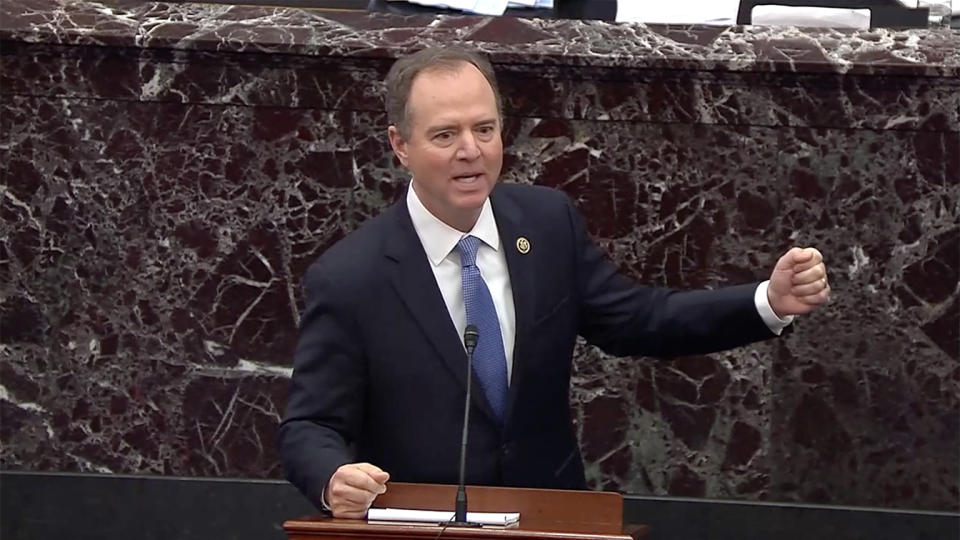Schiff calls Dershowitz arguments on a president's foreign policy powers 'constitutional madness'
- Oops!Something went wrong.Please try again later.
- Oops!Something went wrong.Please try again later.
WASHINGTON — House impeachment manager Adam Schiff on Thursday sharply criticized the legal theory used by attorney Alan Dershowitz to defend President Trump’s pressure campaign on Ukraine, calling it “constitutional madness.”
“There is no limiting principle to the argument we heard last night,” Schiff, D-Calif., said during the impeachment trial in the Senate chamber. “It’s astounding.”
“What we have seen over the last couple of days is a descent into constitutional madness,” he added.
Schiff was referring to arguments made Wednesday evening by Dershowitz on behalf of Trump’s defense. An emeritus professor at Harvard Law School, Dershowitz asserted that if a president exchanges in a quid pro quo with a foreign power in order to help himself get reelected but also perceives it to be in the public interest, that alone is not enough to impeach that president.
“Everybody has mixed motives, and for there to be a constitutional impeachment based on mixed motives would permit almost any president to be impeached,” Dershowitz said.
Dershowitz argued that history is filled with examples of presidents acting simultaneously to benefit the country and their own political prospects.

“How many presidents have made foreign policy decisions after checking with their political advisers and their pollsters? If you are just acting in the national interest, why do you need pollsters? Why do you need political advisers? Just do what is best for the country. But if you want to balance what is in the public interest with what is in your party’s electoral interest and your own electoral interest, it is impossible to discern how much weight is given to one or the other,” Dershowitz said.
The statement from Dershowitz that drew the most attention was this: “If a president does something which he believes will help him get elected — in the public interest — that cannot be the kind of quid pro quo that results in impeachment.”
Legal scholars quickly took issue with Dershowitz’s claim.
“It means that a president could break any law or abuse any power and say that it was for the public interest because the public interest would be served by his or her election,” Erwin Chemerinsky, a prominent law professor, told NBC News.
“This argument is more accurately described as the assertion that the success of the politician is too important to be left to a fair election,” wrote David French, a conservative constitutional lawyer, in the Dispatch. “The president can abuse his power to influence the public so long as he doesn’t clearly commit a crime.”

Dershowitz tweeted on Thursday that he was being “willfully distorted” and misunderstood “as if I had said that if a president believes that his re-election was in the national interest, he can do anything.”
“I said nothing like that, as anyone who actually heard what I said can attest,” he wrote.
Dershowitz clarified that his argument was that there is “pure national interest” and “pure corrupt motive” and then there is a “mixed motive” scenario, and that mixed motives are “often the reality of politics and that helping one’s own re-election efforts cannot — by itself— necessarily be deemed corrupt.”
Schiff, however, blasted Dershowitz’s arguments before the Senate as giving the president almost unlimited powers to act in his own political interests, without fear of consequences.
“That is the normalization of lawlessness,” Schiff said.
_____
Read more from Yahoo News:




